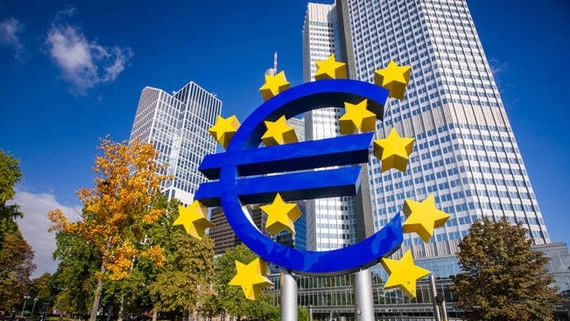
Business
09:01, 03-Oct-2017
ECB hints at drawn-out end to bond-buying
CGTN

The European Central Bank (ECB) may take a longer path to the end of its mass bond-buying scheme than observers expect as it confronts stubbornly low inflation, the institution's chief economist hinted Monday.
"We are still some distance away from a sustained adjustment" in inflation towards the bank's target of just below 2 percent – believed to be most favorable for growth – Peter Praet (?) told a London financial conference.
With financial markets calmer than in 2015, when bond-buying was launched with a bang, "a purchase plan that is to be executed over a more extended time interval" might work better, he added.
The ECB has set interest rates at historic lows and buys 60 billion euros ($70.5 billion) of bonds per month in its attempt to boost price growth.
Governors believe the policies encourage banks to lend to businesses and households for mortgages, consumption and investments, powering economic growth which in turn drives up inflation.
But after a brief spike earlier in 2017, prices rose by only 1.5 percent year-on-year in September, the same pace as the previous month – despite a pick-up in growth and unemployment at 8-year lows.
Observers long expected the ECB to follow the example of the US Federal Reserve and lay out a detailed schedule for reducing bond purchases step-by-step from January, the month after the present cut-off date.
Once its shopping spree is over, the central bank could still use its mammoth stash of more than two trillion euros of bonds to influence markets, buying new bonds as old ones are paid off.
But Praet argued that would not be enough financial firepower to keep borrowing easy in the real economy of consumers and companies.
His comments suggest policymakers could simply announce an extension of their purchases at a slower monthly pace, rather than charting the exit in detail.
That strategy would also leave the ECB more flexibility to beef up its interventions again if inflation remains low.
Nevertheless, governors cannot keep up bond-buying indefinitely.
The ECB is expected to run up against technical limits to the scheme soon, while voices on the bank's 25-strong governing council calling for it to be wound down become louder as economic growth in the eurozone strengthens.
Source(s): AFP

SITEMAP
Copyright © 2018 CGTN. Beijing ICP prepared NO.16065310-3
Copyright © 2018 CGTN. Beijing ICP prepared NO.16065310-3